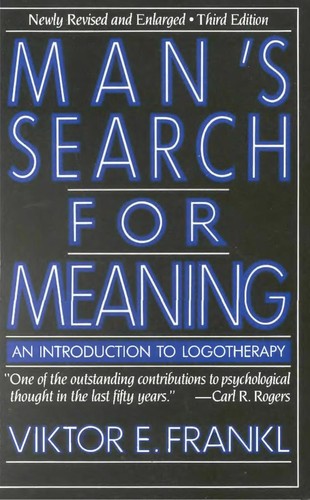Paperback, 189 pages
English language
Published Nov. 5, 1984 by Touchstone/Simon & Schuster.

Paperback, 189 pages
English language
Published Nov. 5, 1984 by Touchstone/Simon & Schuster.
Few books in recent decades have had the continuing impact of Dr Viktor Frankl's Man's Search for Meaning—the classic best seller now considered to be one of the most important contributions to psychiatry since Freud. Frankl gives a moving account of his life amid the horrors of the Nazi death camps, chronicling the harrowing experience that led to his discovery of his theory of logotherapy. A profound revelation born out of his years as a prisoner in Auschwitz & other concentration camps, logotherapy is a modern & positive approach to the mentally or spiritually disturbed personality. Stressing the freedom to transcend suffering & find a meaning to life regardless of circumstances, it's a theory which, since its conception, has exercised a tremendous influence upon the entire field of psychiatry & psychology.
Here, Frankl not only describes the genesis & development of logotherapy but also explains its basic concepts, & …
Few books in recent decades have had the continuing impact of Dr Viktor Frankl's Man's Search for Meaning—the classic best seller now considered to be one of the most important contributions to psychiatry since Freud. Frankl gives a moving account of his life amid the horrors of the Nazi death camps, chronicling the harrowing experience that led to his discovery of his theory of logotherapy. A profound revelation born out of his years as a prisoner in Auschwitz & other concentration camps, logotherapy is a modern & positive approach to the mentally or spiritually disturbed personality. Stressing the freedom to transcend suffering & find a meaning to life regardless of circumstances, it's a theory which, since its conception, has exercised a tremendous influence upon the entire field of psychiatry & psychology.
Here, Frankl not only describes the genesis & development of logotherapy but also explains its basic concepts, & in this revised enlarged edition, has included a new chapter, entitled "The Case for a Tragic Optimism," in which he updates theoretical conclusions of the book. The result is an invaluable work by one of the world's preeminent psychiatrists. (back cover)